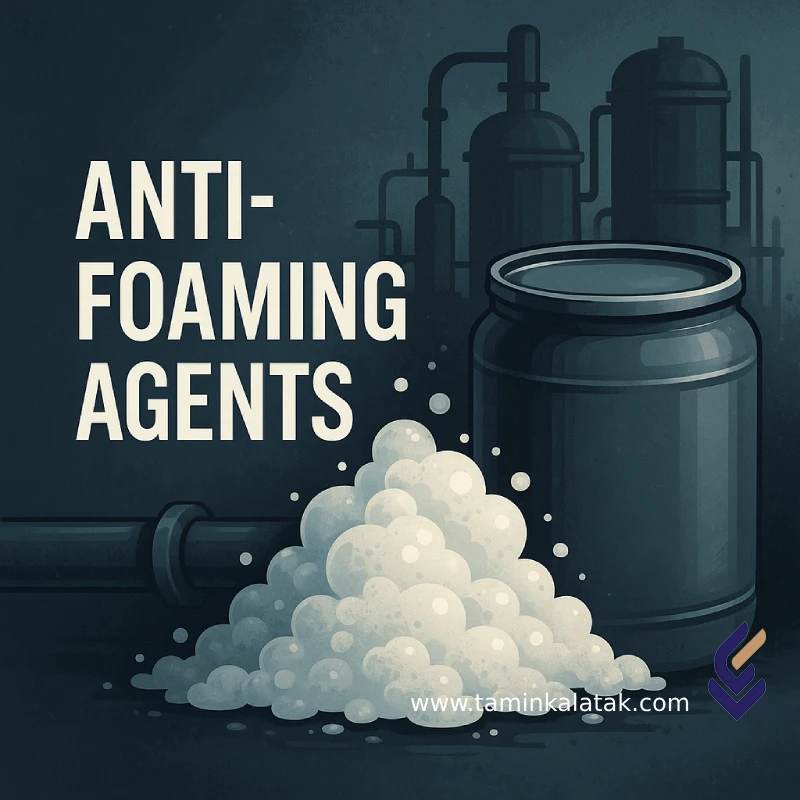Polymers are made up of very large molecules made up of many repeating units called monomers, which ultimately form this long polymer chain
AntiFoam Agents
Anti-Foaming Agents—also known as antifoams or defoamers—are substances used to reduce or prevent foam formation in industrial and chemical processes. Excessive foam can disrupt production, reduce process efficiency, and even damage equipment; therefore, the use of anti-foaming agents is essential in many industries.
Structure of Anti-Foaming Agents
Anti-foaming agents are typically composed of surface-active compounds, mineral or silicone oils, and solid additives such as silica.
Their formulation is designed to spread rapidly across foam surfaces, collapse air bubbles, and prevent re-foaming depending on the application.
| Type of Antifoam | Main Composition | Common Applications |
|---|---|---|
| Silicone-based | Silicone oil + Silica | Chemical and petroleum industries |
| Non-silicone | Mineral oil + Emulsifiers | Food and pharmaceutical industries |
| Powder type | Solid polymer blends | Detergent powders, chemical fertilizers |
Key Characteristics of Anti-Foaming Agents
-
High surface activity: Reduces surface tension and breaks air bubbles.
-
Rapid dispersibility: Quickly spreads over foam surfaces for efficient defoaming.
-
Chemical stability: Resistant to variations in temperature and pH.
-
Non-toxic (for specific grades): Especially important in food and pharmaceutical applications.
Applications of Anti-Foaming Agents
Anti-foaming agents are used across a wide range of industries. Major applications include:
-
Food and Beverage Industry: Preventing foam formation during fermentation, sugar refining, and dairy processing.
-
Oil, Gas, and Petrochemical Industries: Reducing foam in distillation towers and fluid transfer systems.
-
Wastewater Treatment: Controlling foam in aeration basins and treatment tanks.
-
Pharmaceutical and Chemical Manufacturing: Preventing foam in reactors and filling lines.
-
Paints, Resins, and Adhesives Production: Maintaining product uniformity and appearance by eliminating foam.
Advantages of Using Anti-Foaming Agents
-
Improves production efficiency.
-
Protects industrial equipment from damage due to foam.
-
Saves time and energy in manufacturing processes.
-
Enhances final product quality.
-
Reduces production downtime caused by foam-related issues.
Disadvantages
-
May contaminate sensitive products if improperly used.
-
May require repeated addition due to evaporation or degradation.
-
Incorrect selection can cause incompatibility with the process system.
-
Some advanced formulations can be expensive.
Conclusion
Selecting the right anti-foaming agent depends on the type of industry, process conditions, and nature of the foam generated.
Using high-quality antifoams not only optimizes production efficiency but also extends equipment lifespan and ensures consistent product performance.
Applications
| Applications | , , , , |
|---|
Antifoam agents
| Products | Grade | Melt Flow Index (MFI) (g/10 min) | Density (g/mm3) | Process method | Applications | Data Sheet | MSDS |
|---|---|---|---|---|---|---|---|
| Silicone anti-foam | AF-S100 | - | 0.97 | Emulsion/Injection | Wastewater treatment, oil industries, paint and coating | ||
| Non-silicone antifoam | AF-N200 | - | 0.95 | Emulsifiable | Food, beverage, paper industries | ||
| Low-density polyethylene (LDPE) | 2420D | 2.2 | 0.918 | Injection molding | Packaging, caps, bottles, soft tubes | ||
| High-density polyethylene (HDPE) | 5000S | 0.35 | 0.95 | Blow molding | Industrial containers, water tanks, pressure pipes | ||
| Polypropylene (PP) | Z30S | 3 | 0.905 | Injection/Extrusion | Home appliances, auto parts, food packaging |







